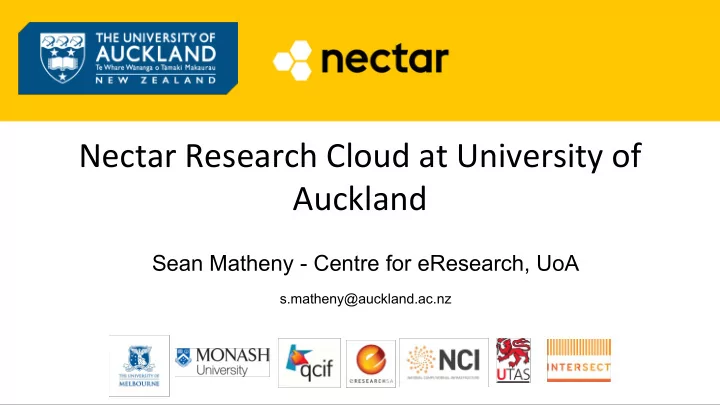

Nectar Research Cloud at University of Auckland Sean Matheny - Centre for eResearch, UoA s.matheny@auckland.ac.nz
What is it? • NeCTAR (National eResearch Collaboration Tools and Resources) founded at UniMelb in 2011 • Provides researchers with computing infrastructure (IaaS), software, workflows, and other services. • Fits in between your laptop/desktop and HPC in scale, interactive use cases • Gives you the freedom to manage your own resources - more self service, but a little less support (but we’ll always help!) • Very few barriers-- an open playground for research • Reproducible and collaborative- helps solve the “science crisis” • Private cloud - all data is stored in UoA data centres unless you share it
Participating Member Nodes
...and University of Auckland! • First New Zealand Nectar Node at University of Auckland (pilot / provisional member) • Launched November 2017 Image credit: Cardiac Society of Australia and New Zealand
How it works: getting on board • Who can use: Any UoA postgraduate or staff researcher • Trial: 3-month trial limited to 2 cores and 10GB storage to evaluate • Where: log in with Tuakiri at https://dashboard.rc.nectar.org.au • Request Project: Submit a request from the allocations Tab in dashboard – Need research abstract for “research use case” field – Projects renewable, 12 month max terms
Cloud Services Available to UoA Researchers • Compute - VMs, GPU flavors – Nectar provided vanila operating system images – Windows images available upon request – Community provided speciality images • Storage - Volume storage, Object storage • Access to virtual labs such as GVL, Marine VL, Characterisation VL (see next) • Higher level services: – Application catalog for non-technical deployment of RStudio/Shiny, Jupyter, Docker, etc – DNS (@ *.nectar.auckland.ac.nz, *.cloud.org.au, BYO). Self service. – Docker/Kubernetes Container launching (individual and orchestration) – Self service networking (private networking with floating public addresses) – Data processing platform (Hadoop and Spark)
Local Capacity at UoA • Current local capacity is: – 2016 CPU cores – ~1 PB raw storage, ½ to ⅓ available for your use (2-3 local copies, but no automatic backups) – ~14TB RAM – 3-site object storage available for backup, or files to share • GPUs (next)
Local Capacity at UoA - GPUs • 6 x NVIDIA Tesla Pascal (P40) GPUs • 5 x NVIDIA Tesla Kepler (K40) GPUs • 10 x NVIDIA Tesla Kepler (K20) GPUs • High demand resource - 3 month allocations, renew possible • You choose your OS and environment, or use pre-built image • Potentially Host your org’s GPUs in Nectar, if long term and/or exclusive access required! • We’re looking for ideas for shared environments - let us know your thoughts!
Not within UoA firewall - pros and cons - Limited access to university services (no Unifiles) - No standard UoA authentication in VMs, but can be integrated - No Incremental / automatic backups for now (but you can automate!) - Limited access to Windows licensing (individual use) + Freedom! You build whatever you’d like- you’re in charge. + Now have access to run MATLAB, Ansys, CST Studio, Abaqus + Access to UoA Dropbox, Google Drive, VPN; CloudStor integrated + Each instance gets public ip, DNS name available (several options) + Very easy to share application or VM with colleagues or the world
How it works: support • Nectar is a IaaS self-service model : requires willingness to learn! • Applications and OS: Are largely your responsibility (although we will be helpful!) • Support is available for the infrastructure : – e.g. launching and accessing instances – Create support ticket from in top of dashboard – Or email: nectarsupport@auckland.ac.nz – Then just reply to emails (you won’t be able to log into the helpdesk links in AAF) • Lots of excellent documentation, walkthroughs: – https://support.ehelp.edu.au/support/solutions • Self-paced training: – http://training.nectar.org.au
What is a Virtual Lab (a.k.a. VL)? • Two Definitions : – The Virtual Laboratory is an interactive environment for creating and conducting simulated experiments: a playground for experimentation. ”. (The Virtual Laboratory Environment @ Algorithmic Botany retrieved 11:48, 30 June 2006 (MEST) ) – “ A Virtual Laboratory is a heterogeneous distributed problem solving environment that enables a group of researchers located around the world to work together on a common set of projects.” ( LESTER, retrieved 12:52, 30 June 2006 (MEST)) • VLs in Nectar are separately funded, supported, and run on top of Nectar infrastructure • In most cases, arose organically from successful research groups (not from IT etc) • VLs and Science Clouds are fairly synonymous: Science Clouds are more organized and try to share more common infrastructure and models.
One Example: Genomics Virtual Lab What is GVL? • Is a web portal that provides access to a growing suite of genomics tools that biologists can start working with immediately. • Development led by Melbourne Bioinformatics at UniMelb in collaboration with the Research Computing Centre at the University of Queensland • Provides a workbench for reproducible results • Tutorials to help Biologists learn analysis tools
GVL in Use
Other Virtual Labs and Science Clouds • Contact individual VL for access and onboarding info • Support is through the same methods described earlier (helpdesk) • We’re happy to have a chat and support you if you’d like to create your own VL! https://nectar.org.au/labs-and-tools/
RStudio Example - All You Need to Deploy
RStudio and Shiny in Browser
...Plus a Desktop in Your Web Browser
Questions? Sean Matheny Centre for eResearch University of Auckland s.matheny@auckland.ac.nz http://nectar.org.au Dashboard: https://dashboard.rc.nectar.org.au/
Recommend
More recommend